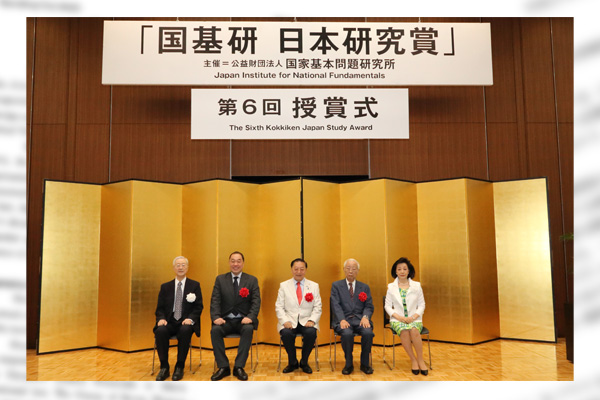Comfort Women and Sex in the Battle Zone (Hamilton Books), an English translation of a book by Japanese modern historian Ikuhiko Hata, has won this year’s Japan Study Special Award from the Japan Institute for National Fundamentals. The JINF Japan Study Encouragement Award has been given to two other Japanese books: The Anti-Japanese Movement in the United States and US-Japan Relations: Why the ‘Japanese-Exclusion Act’ was Enacted (Asahi Shimbun Publications) by Tosh Minohara, a professor at the Graduate School of Law and Politics, Kobe University, and A Warning to the Japanese from a Tibetan Whose Country Was Invaded by China with 1,200,000 of Its People Victimized: Be on Alert for the Terror of China's Inherently Aggressive Expansionism (Heart Shuppan) by Pema Gyalpo, a professor at Takushoku University. JINF held a ceremony to present these awards at the Iino Hall & Conference Center in Tokyo on July 10.
Modern historian Hata’s empirical study given high ratings
Although the Japan Study Award has been given to foreigners’ research books that indicate deep understanding about Japan, provide new viewpoints or raise new questions, JINF has decided to honor Japanese modern historian Hata with the special award under the sixth annual Japan Study Award program.
The book is an English translation of a book published in Japan in 1999. Hata in the book raised questions about controversial comfort women issue by arguing that (1) even a famous pro-Korean Japanese scholar has concluded that there has been no evidence indicating the coercive recruitment of comfort women on the Korean Peninsula and that (2) Japanese accounted for the largest share or 8,000 persons of an estimated 20,000 comfort women while the number of Korean comfort women was limited to only 4,000. The Japanese book has been translated by an American historian into English in an easy-to-understand manner for publication by the major U.S. publishing company.
June Dreyer, a professor at the University of Miami who received the fourth Japan Study Award, in her book review says: "Hata has impartially set out the facts and leaves it up to readers to draw their own conclusions." Hata’s book is thus rated as an excellent empirical study keeping down self-assertiveness.
Foreigners occasionally ask the JINF Secretariat if comfort women were coercively recruited or comfort women were limited to Koreans. Hata answered these questions. As noted by Hata in his speech for accepting the award, however, only one Japanese former comfort woman told him her experiences. She did so on condition of anonymity, indicating Japan’s cultural differences with South Korea where multiple former comfort women claimed compensation.
Tibetan tragedy should not be repeated
Prof. Minohara subject to the Japan Study Encouragement Award is a fourth-generation Japanese American from California. The anti-Japanese movement that grew in California led to the California Alien Land Laws of 1913 and 1920 before the enactment of the U.S. Immigration Act of 1924 known as a Japanese exclusion act. His book verifies how the anti-Japanese movement affected Japan-U.S. relations.
Prof. Pema came to Japan, escaping from his homeland Tibet that became a victim of China’s territorial expansionism. With support from volunteers, he underwent junior and senior high school and university education in Japan, becoming a Japanese citizen in 2005. He has had a sense of crisis about Japanese people’s lack of awareness of Chinese threats. In gratitude for Japan that has welcomed and raised him, he strongly warns Japan that the tragedy of Tibet should not be repeated.
Hironobu Ishikawa is a director and Planning Committee member of the Japan Institute for National Fundamentals and a former Washington D.C. correspondent and international news editor of The Yomiuri Shimbun newspaper.


